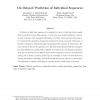Free Online Productivity Tools
i2Speak
i2Symbol
i2OCR
iTex2Img
iWeb2Print
iWeb2Shot
i2Type
iPdf2Split
iPdf2Merge
i2Bopomofo
i2Arabic
i2Style
i2Image
i2PDF
iLatex2Rtf
Sci2ools
123
click to vote
TIT
2002
2002
On delayed prediction of individual sequences
Prediction of individual sequences is investigated for cases in which the decision maker observes a delayed version of the sequence, or is forced to issue his/her predictions a number of steps in advance, with incomplete information. For nite action and observation spaces, it is shown that the prediction strategy that minimizes the worst-case regret with respect to the Bayes envelope is obtained through sub-sampling of the sequence of observations. The result extends to the case of logarithmic loss. For nite-state reference prediction strategies, the delayed nite-state predictability is de ned and related to its non-delayed counterpart. As in the non-delayed case, an e cient on-line decision algorithm, based on the incremental parsing rule, is shown to perform in the long run essentially as well as the best nite-state strategy determined in hindsight, with full knowledge of the given sequence of observations. An application to adaptive prefetching in computer memory architectures is d...
Related Content
| Added | 23 Dec 2010 |
| Updated | 23 Dec 2010 |
| Type | Journal |
| Year | 2002 |
| Where | TIT |
| Authors | Marcelo J. Weinberger, Erik Ordentlich |
Comments (0)

